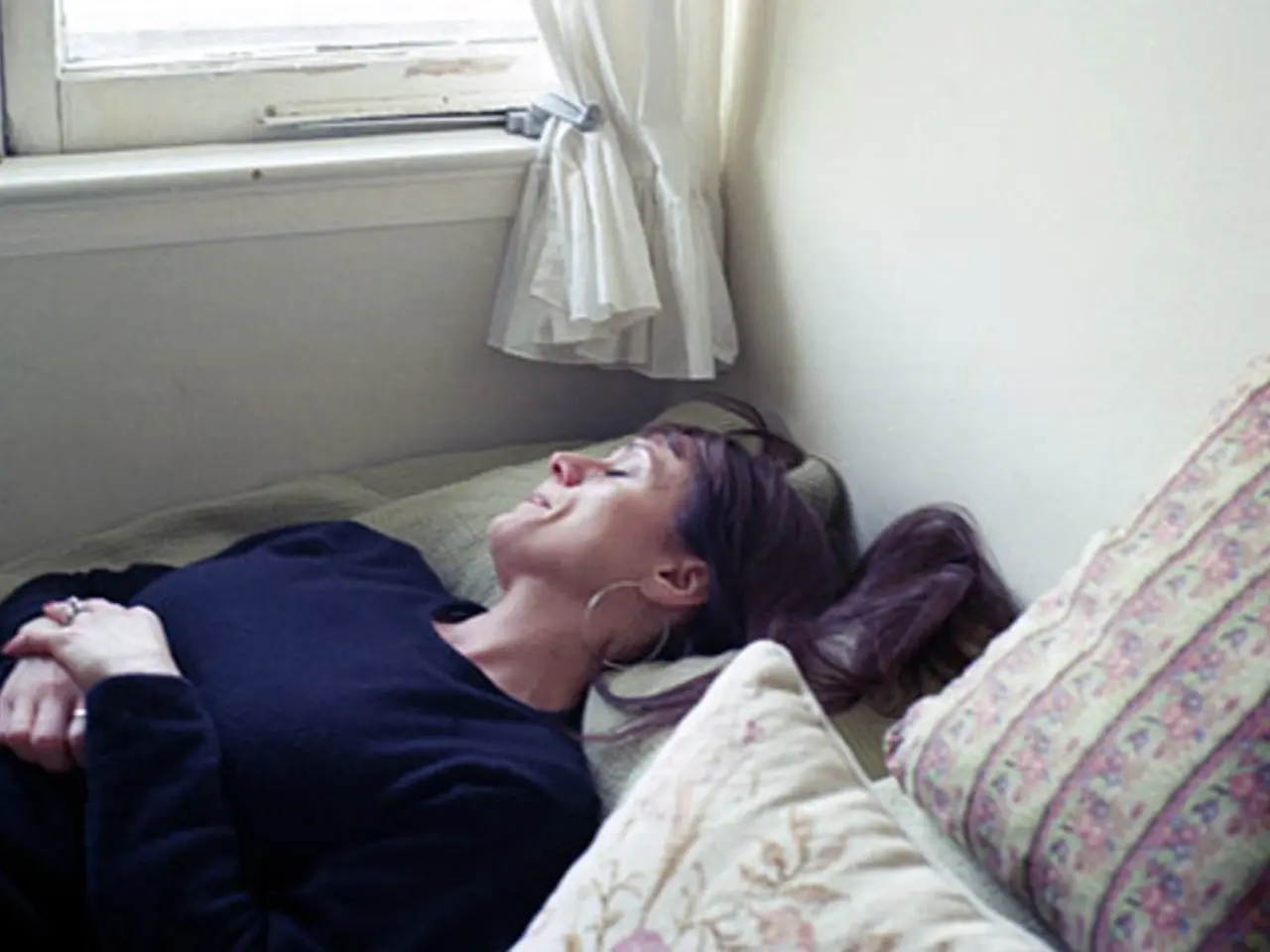Strategies to Preserve Restful Slumber During Menopause
Perimenopause and menopause, transitional phases in a woman's life, often bring about sleep problems. These issues are primarily caused by declining levels of estrogen and progesterone, which disrupt the body's sleep regulation systems [1][2][5].
Estrogen plays a crucial role in supporting deep sleep by influencing serotonin and melatonin production, hormones essential for the sleep-wake cycle. Progesterone, on the other hand, has a calming, sleep-inducing effect. When levels of these hormones drop, women experience difficulties falling asleep and maintaining restorative sleep.
This hormonal imbalance leads to several specific sleep disruptors. Night sweats and hot flashes, caused by increased sensitivity in the hypothalamus, can abruptly wake women and reduce sleep quality [1][2]. Mood swings and anxiety, stemming from hormonal and brain chemistry changes, further impair restful sleep [1]. Additionally, there is an increased risk of sleep apnea and snoring due to reduced airway muscle tone and possible weight gain, leading to fragmented sleep and daytime fatigue [3]. Conditions such as restless legs syndrome are also more prevalent postmenopause [1].
However, there are natural alternatives to improve sleep quality during this phase. Stress reduction techniques such as meditation, aromatherapy, and mindfulness can help calm the mind and improve sleep onset [4]. Maintaining a moderate, comfortable sleeping environment, avoiding triggers of night sweats like spicy foods, alcohol, and high stress near bedtime, improves comfort during sleep [2]. Lifestyle habits like regular exercise, a balanced diet, and consistent sleep schedules support overall sleep health [4]. Some women find natural supplements or herbal remedies, such as valerian root and melatonin supplements, helpful, though clinical evidence varies, and consultation with a healthcare provider is recommended [4].
Black cohosh, a natural supplement, has been found to improve objective sleep in postmenopausal women with sleep disturbances. Melatonin supplements, taken about an hour before bedtime, can help signal the body that it's time to sleep. Aerobic exercise during menopause could potentially reduce hot flashes, thereby reducing nighttime awakenings. Yoga is linked to improved sleep in menopause and may help with insomnia [4].
In summary, the decline of estrogen and progesterone during perimenopause and menopause disrupts sleep by affecting hormonal regulation of temperature, mood, and brain activity. Addressing these through natural stress management, lifestyle changes, and environmental adjustments can improve sleep quality without medication [1][2][4][5]. It is essential to consult with a healthcare provider to determine the most effective strategies for individual needs.
[1] Black cohosh improves objective sleep in postmenopausal women with sleep disturbances. [2] These sleep issues are more prevalent in the days leading up to their periods. [3] Women beginning menopause transition experience more sleep disturbances. [4] Progesterone, a hormone produced after ovulation, has a significant influence on sleep. [5] Yoga is linked to improved sleep in menopause. [6] Aerobic exercise during menopause could potentially reduce hot flashes. [7] Yoga could improve insomnia in menopausal women. [8] Exercise has been shown to reduce hot flashes in perimenopausal and menopausal women, potentially reducing nighttime awakenings. [9] Women in menopause transition have a lower percentage of deep sleep. [10] Fluctuating hormone levels during perimenopause can lead to sleep disturbances. [11] Approaching menopause can cause a shift in progesterone levels. [12] Physical activity can result in significant improvements in sleep for women during menopause. [13] Black cohosh supplements, taken in doses of 40 mg, are known for their power against hot flashes and may help with sleep. [14] Researchers at the Center for Health Sciences at SRI International and the University of the Witwatersrand conducted a study on this topic. [15] Menopause can lead to additional sleep problems beyond those experienced during perimenopause.
- The decline in estrogen and progesterone during perimenopause and menopause negatively affects health-and-wellness, particularly women's sleep, by disrupting sleep regulation systems and causing sleep problems.
- Apart from estrogen, progesterone also plays a significant role in promoting wellness since it has a calming and sleep-inducing effect, but declining progesterone levels during menopause can lead to difficulties in falling asleep and maintaining restorative sleep.
- To improve sleep quality during menopause, one can adopt natural alternatives such as stress reduction techniques like meditation and mindfulness, maintaining a comfortable sleeping environment, regular exercise, a balanced diet, and consistency in sleep schedules, as well as natural supplements like valerian root, melatonin supplements, or black cohosh, but it's advisable to consult a healthcare provider before incorporating any new supplements into one's wellness routine.





